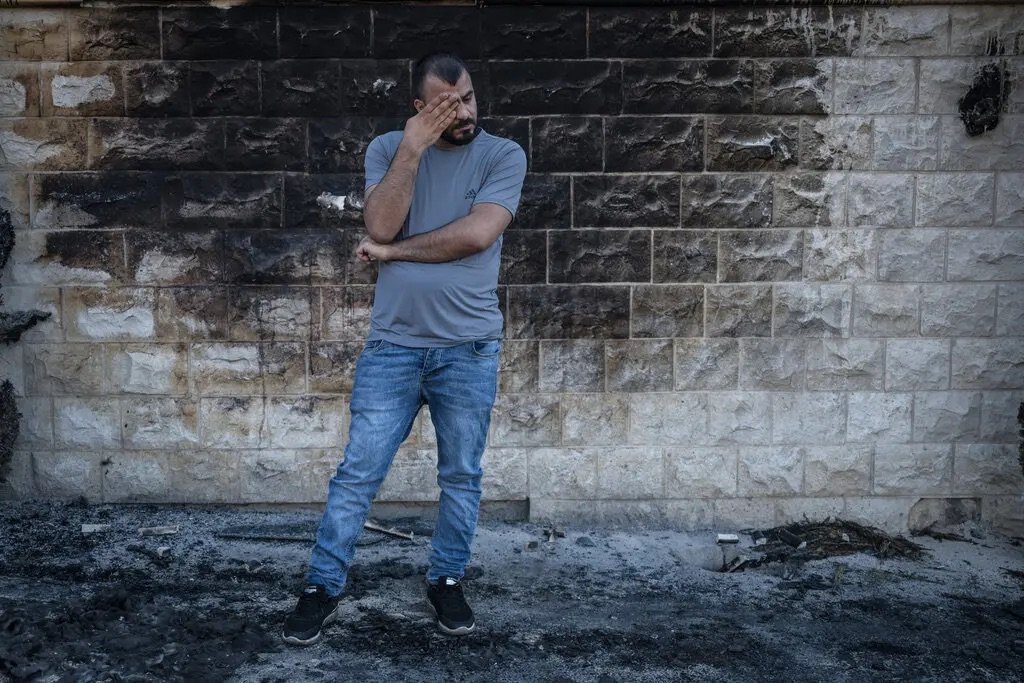One Issue on Which Israeli Extremists Are Mainstream



A Palestinian man in the town of Jit after an attack by Jewish settlers in August.Credit...Sergey Ponomarev for The New York Times
The West Bank is on fire
by Hagai El-Ad
Over the past several weeks, the Israeli military has carried out repeated, large-scale raids on Palestinian towns with drones and ground forces. Armed settlers targeted Palestinians on a rampage through the town of Jit, while Israeli security forces turned a blind eye. Palestinian communities are being emptied of their people. The violence is omnipresent, and the international community appears determined not to stop it.
But this is not a new story. This latest wave of violence is the inevitable result of what can only be understood as Israel’s decades-long effort to achieve total control over the West Bank. And for too long, Israel’s allies, especially the United States, have studiously underplayed or even ignored the existence of this endeavor.
Some Western officials have recently warned that Palestinians now face the threat of Israel’s “creeping” annexation of the occupied West Bank, as if Israel and its occupation of the Palestinian territory are separate realms. In this view, Israel is a democratic state run by civilian authorities, and the occupation is temporary and run by army generals.
But there is only one regime in Israel-Palestine. The Palestinian Authority controls limited aspects of life in fragmented areas of the West Bank; Israel rules over all the major aspects of life in the territory.
Annexation is not a future prospect; it is a fact of life. Israelis and Palestinians live in a one-state reality.
Internationally, much of the blame for Israel’s current policies is laid at the feet of far-right elements in Israel’s government, such as Itamar Ben-Gvir, the national security minister, and Bezalel Smotrich, the finance minister. The United States regards both of them as audacious outsiders who have no place in the political mainstream.
On Feb. 26, 2023, hundreds of settlers rampaged through the Palestinian town of Huwara. One Palestinian was killed, most likely by a settler, according to an investigation conducted by the human rights group B’Tselem and the audio-analysis group Earshot, and more than 100 others were injured. Afterward, Mr. Smotrich said: “Huwara needs to be wiped out. I think that the State of Israel needs to do that — not, God forbid, private individuals.” A State Department spokesperson described his remarks as “repugnant.” (After receiving widespread criticism, Mr. Smotrich apologized.)
Yet the extremism of Mr. Smotrich and Mr. Ben-Gvir couldn’t be more emblematic of Israel’s evident settlement strategy: to permanently control the entirety of the land between the Jordan River and the Mediterranean Sea.
Israel’s plans for full geographical and political control of the West Bank have been evident for decades. In 2022, Prime Minister Benjamin Netanyahu articulated the basic principles of his current government: “The Jewish people have an exclusive and inalienable right to all parts of the Land of Israel. The government will promote and develop the settlement of all parts of the Land of Israel,” he said, specifically including the West Bank in his description of that land.
Other Israeli leaders have long expressed similar sentiments. In 1975, the defense minister, Shimon Peres, who went on to sign the initial Oslo Accord agreement, said of occupied land, “The debate going on today is not about the very need for settlement, not even about its map or dimensions, but about the procedures for organizing it.” He added, “More than a debate about vision, it’s a debate about timing.”
Israel’s occupation of the land is not “temporary.” It is permanent — physically, geographically and administratively.
Since 1967, Israel has overseen the construction of more than 250 settlements and what the government designates as “outposts” in the West Bank. By now, one in 10 Jewish Israelis — over 700,000 people — are settlers there, where they enjoy the same rights as any other Jewish Israeli. Billions of dollars have been invested in the construction of an interconnected, permanent Israeli infrastructure in land that is, by international law, Palestinian.
All along, Israel has used judicial and administrative resources to give its actions in the occupied West Bank a sheen of legality. The Justice Ministry has repeatedly argued before the High Court of Justice that the “military occupation” is essentially temporary. The justices have agreed. This is crucial, because international law regards any military occupation as inherently temporary.
All the while, successive Israeli governments, working with the court’s approval, have permanently transformed the West Bank. Weeks after the end of the 1967 war, the state formally annexed the 27 square miles of the West Bank now known as East Jerusalem. It established a planning system that denies at least 95 percent of Palestinian applications for building permits and routinely issues demolition orders for their homes. It created regional settlement councils and industrial zones, and it took large parcels of West Bank land by designating them as “state land” or military “firing zones” that are off-limits to Palestinians.

